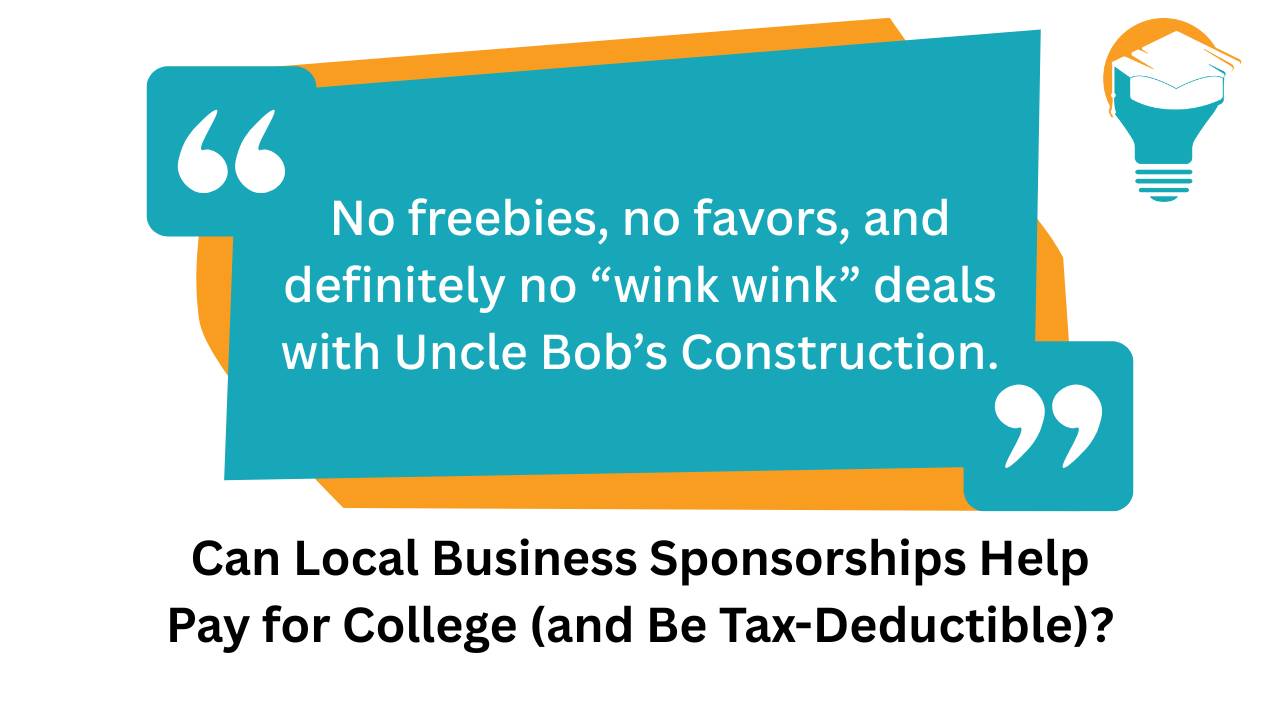Can Local Business Sponsorships Help Pay for College (and Be Tax-Deductible)?
Apr 04, 2025
A Quick Guide for Families Exploring Creative (and Legal) Funding Options
Important Disclaimer: This blog is for educational purposes only and not tax advice.
Please consult a qualified tax professional before attempting anything you read here. We’ve got a great tax team if you need one—but this isn’t a substitute for professional guidance.

So, a Business Wants to Help Pay for College…
…awesome! But before your student starts printing T-shirts with a plumbing company logo and calling themselves the “Proudly Sponsored by Joe’s Rooter & Drain College Fund,” let’s talk about what actually works—and what could land you in hot water with the IRS.
Let’s break down the difference between a sponsorship and a scholarship, how each can (possibly) be tax-deductible, and how to do it without tripping any tax wires.
What’s a Sponsorship?
In this case, a sponsorship isn’t just a business handing your kid a check out of generosity. That’s called a gift. And while gifts are lovely, they’re not tax-deductible for the business.
On the other hand, a sponsorship is a business expense where the student provides promotional value in exchange for money. Think:
- Wearing the business’s logo at community events,
- Giving them shoutouts on social media,
- Including them in a senior project presentation (yes, really),
- Or being featured in a local newspaper story with a “Sponsored by…” line.
It’s like NASCAR but with fewer crashes and more FAFSA forms.
Can the Business Write It Off?
Yes… if it’s legit.
The IRS says a business can deduct a sponsorship as an advertising expense if it meets these key criteria:
- The sponsorship isn’t a gift—it’s a business transaction,
- The student gives something of real promotional value in return,
- There’s a clear business benefit, like visibility or local goodwill,
- The whole thing is documented like any other business deal.
Basically: no freebies, no favors, and definitely no “wink wink” deals with Uncle Bob’s Construction.
What If the Sponsor Isn’t a Business?
We’re glad you asked—because this part trips up a lot of well-meaning families.
If the person sponsoring the student isn’t a business owner and doesn’t have a legitimate business reason for the expense, it’s not tax-deductible—period.
Even if they:
• Call it a sponsorship,
• Ask for a thank-you post on Instagram,
• Or write it off on TurboTax and cross their fingers…
… the IRS will likely see it for what it is: a personal gift, not a business expense. And gifts aren’t deductible for individuals. (They may, however, trigger gift tax rules if the amount exceeds annual limits—more reason to talk to a pro.)
Bottom line: No business = no deduction.
What Doesn’t Count
Even with the best intentions, some arrangements just won’t qualify. Examples include:
- A business owner writing a check to help “just because”—that’s a personal gift, not a sponsorship.
- Payments from non-business individuals trying to claim a deduction? Also a no-go.
- Sponsorships to relatives of the business owner. This gets flagged faster than a bad haircut in a passport photo.
- No services or promotion in return = no deduction.
- Saying “It’s for the kids!” doesn’t count as legal documentation (unfortunately).
Can a Business Just Set Up a Scholarship?
Yes, but this is a totally different animal. A scholarship program has to follow stricter rules to be considered deductible—especially if the business wants to stay on the IRS’s good side.
To be legit, a scholarship usually needs to:
- Be open to more than one person (i.e., not just your neighbor’s kid),
- Be administered fairly, often through a nonprofit or third party,
- Follow IRS rules for employer-sponsored or charitable scholarships.
In other words: not something you throw together on a napkin at your Rotary meeting.
Will My Student Pay Taxes on the Money?
Maybe. Here’s the deal:
- If the money is used for qualified education expenses (like tuition, books, and required fees) and it qualifies as a legitimate scholarship, it may be tax-free.
- But if it’s considered payment for services—like promoting a business—it’s taxable income, and your student may need to file a tax return (a great way to start adulting early, right?).
How to Do It Right (and Stay Out of Trouble)
If you’re thinking of going the sponsorship route, follow these best practices:
- Get it in writing.
- Seriously. Have a basic agreement that spells out:
- What the student will do (e.g., 5 Instagram posts, a community event appearance, wearing a branded backpack, etc.),
- What the business is paying for,
- Timeline, duration, and expectations.
- Pay the school directly if possible. It just looks better and helps show the funds went toward education, not midnight pizza runs.
- Loop in a tax pro. Whether it’s ours or someone you trust, this is not something you want to wing. One wrong move, and that sponsorship turns into a very expensive “oops.”
Thinking About Doing This?
We work with families and small business owners all the time to create creative (and compliant) funding solutions for college. If you’re wondering whether a sponsorship or scholarship setup could help your student—and help your business at the same time—we’ve got the team to guide you through it.
👉 Book a free consultation at www.gettuitionpaid.com
Let’s make sure your plan helps your student and doesn’t invite any surprise letters from the IRS.
